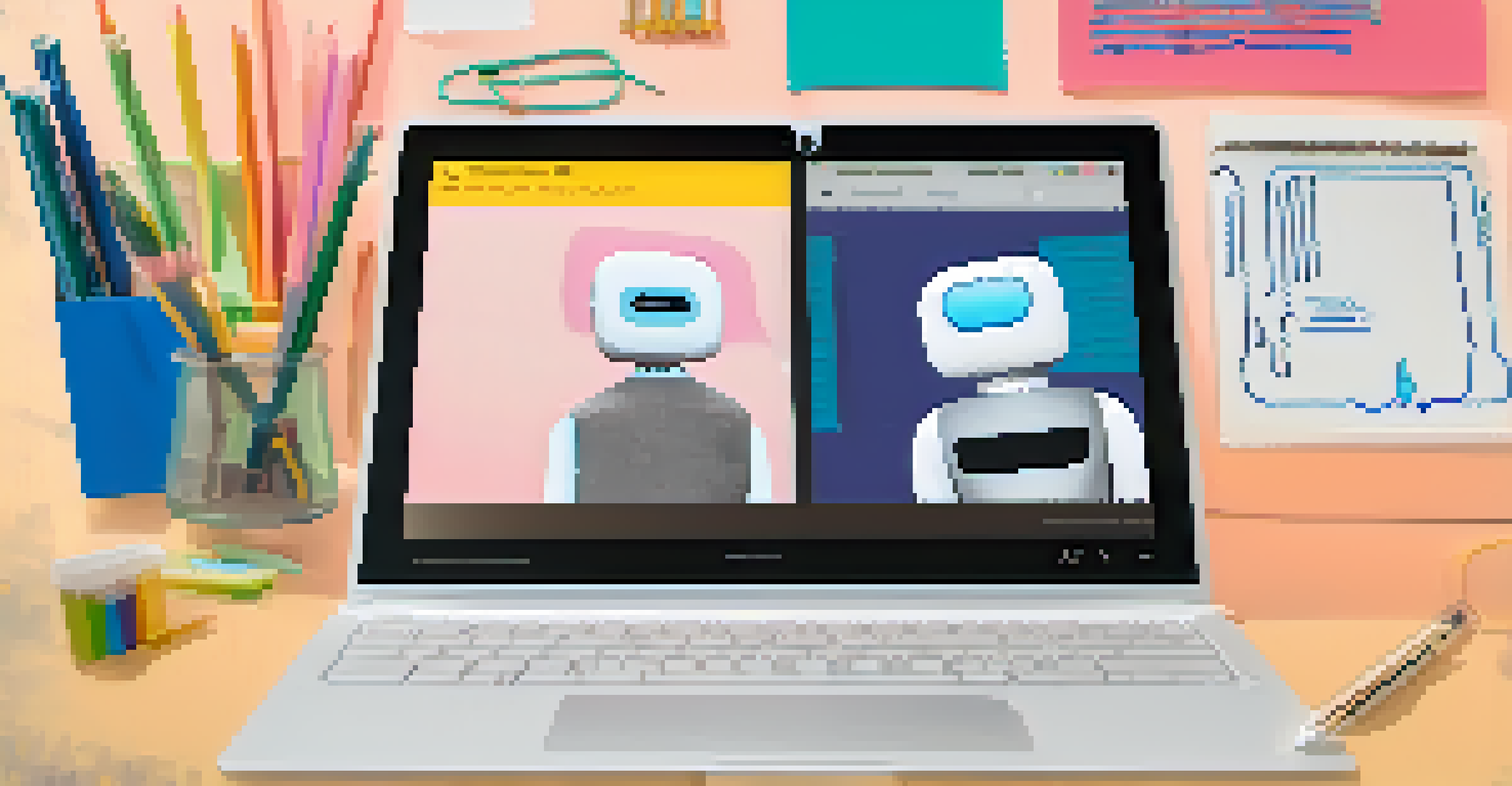AI's Role in Supporting Mental Health in Education

Understanding AI's Role in Education and Mental Health
Artificial Intelligence, or AI, has emerged as a powerful tool in education, particularly in supporting mental health. By analyzing student behavior and learning patterns, AI can identify those who may be struggling emotionally. This proactive approach allows educators to intervene early and provide necessary resources, creating a safer and more supportive environment for students.
Artificial intelligence is a tool for enhancing human capability, not a replacement for it.
Imagine a teacher who can instantly recognize when a student shows signs of stress or disengagement. With AI, this is possible. The technology can process vast amounts of data, such as attendance, participation, and even social media activity, to flag potential mental health issues. This not only helps in timely intervention but also fosters a culture of awareness around mental health in schools.
Moreover, AI can complement traditional mental health resources by offering personalized support. For example, chatbots equipped with AI can provide immediate help for students feeling overwhelmed. This kind of support is particularly valuable as it offers a non-judgmental space for students to express their feelings, making mental health care more accessible.
Benefits of AI Tools for Student Well-Being
AI tools can enhance student well-being by providing tailored recommendations based on individual needs. Just like a fitness app that adjusts workouts according to your progress, AI can suggest mental health resources that align with a student's specific situation. This personalized approach ensures that support is relevant and effective.

For instance, platforms like Woebot use AI to deliver cognitive-behavioral therapy techniques through chat interfaces. Students can engage with these tools anytime, offering them flexibility and control over their mental health. This can significantly reduce barriers students face in seeking help, especially for those who may feel stigmatized.
AI Enhances Early Mental Health Support
AI tools can proactively identify students struggling emotionally, enabling timely interventions by educators.
Additionally, AI can help educators track the overall mental health trends within their classrooms. By analyzing aggregated data, they can identify common stressors affecting students, enabling them to address these issues collectively. This not only improves individual student experiences but also strengthens the school community.
AI-Powered Assessments: A Game Changer for Educators
AI-powered assessments provide educators with deeper insights into their students' mental health. Instead of relying solely on standardized tests, teachers can utilize AI tools to gauge emotional and psychological well-being through interactive assessments. These tools can highlight areas where students may need additional support, fostering a more holistic approach to education.
The greatest weapon against stress is our ability to choose one thought over another.
Consider an AI system that analyzes students' responses to various prompts, detecting patterns that may indicate anxiety or depression. This real-time feedback equips educators with the knowledge they need to adapt their teaching strategies. For example, if a significant number of students express feeling overwhelmed, a teacher might choose to implement stress-reduction techniques into their curriculum.
Furthermore, these assessments can be ongoing, providing a continuous picture of student well-being. This allows for adjustments to be made promptly, ensuring that mental health support is not just reactive, but also proactive. In essence, AI empowers educators to create a responsive learning environment that prioritizes mental health.
Creating Safe Spaces with AI Solutions
AI solutions can help create safe spaces for students to discuss their mental health. For example, AI chatbots can offer a confidential platform where students can express their concerns without fear of judgment. This anonymity can encourage more students to seek help, ultimately leading to better mental health outcomes.
Schools can integrate these AI tools into their existing mental health programs, enhancing the resources available to students. Imagine a scenario where a student struggles with bullying but feels uncomfortable speaking to a counselor directly. An AI chatbot can provide immediate support and resources, guiding them toward the right human help when needed.
Personalized AI Resources for Students
AI provides tailored mental health resources, such as chatbots, that offer immediate and non-judgmental support.
Moreover, AI can facilitate peer support networks by connecting students with similar experiences. This fosters a sense of community and belonging, which is crucial for mental well-being. By leveraging technology, educational institutions can cultivate an environment where students feel valued and understood.
Addressing Mental Health Stigma through AI Education
AI can play a pivotal role in reducing stigma surrounding mental health in educational settings. By incorporating AI-driven educational programs, schools can raise awareness about mental health issues and promote understanding among students and staff. This proactive stance helps normalize conversations about mental health, which is essential for fostering a supportive environment.
For example, AI platforms can curate personalized educational content that resonates with students, teaching them about mental health in engaging ways. This not only informs but also empowers students to take charge of their mental well-being. As they learn more about mental health, students are more likely to support their peers and seek help when needed.
Additionally, AI can help track the effectiveness of stigma-reduction programs, ensuring that schools can adapt their approaches based on data-driven insights. This continuous improvement not only enhances the educational experience but also builds a culture of acceptance around mental health issues.
Challenges of Implementing AI in Mental Health Support
While the benefits of AI in mental health support are significant, challenges remain in its implementation. One major concern is data privacy; schools must ensure that student information is kept confidential and secure. Clear guidelines and regulations must be established to protect sensitive data and maintain trust among students and parents.
Another challenge is the potential for AI systems to misinterpret data, leading to inaccurate assessments of a student's mental health. It's crucial that educators are trained to use these tools effectively, understanding their limitations and the importance of human oversight. AI should serve as a complement to, rather than a replacement for, traditional mental health resources.
Addressing Stigma with AI Education
AI-driven programs in schools can raise awareness and normalize conversations around mental health, reducing stigma.
Finally, there’s the issue of accessibility. Not all students have equal access to technology, which can create disparities in support. Schools must work to ensure that AI tools are available to all students, regardless of their socioeconomic status, to promote equity in mental health care.
The Future of AI in Educational Mental Health Support
The future of AI in educational mental health support looks promising as technology continues to evolve. With advancements in machine learning and natural language processing, AI tools will become even more sophisticated in understanding and responding to student needs. This evolution could lead to more effective interventions and support systems tailored to individual students.
Imagine a future where AI can not only analyze data but also predict mental health crises before they occur. By identifying warning signs and providing timely support, these tools could significantly reduce the impact of mental health challenges on students' academic performance and overall well-being.

Ultimately, the integration of AI in education has the potential to transform how we approach mental health support. As we embrace these technologies, it's essential to prioritize ethical considerations and maintain a human-centered approach, ensuring that mental health care remains compassionate and accessible for all students.